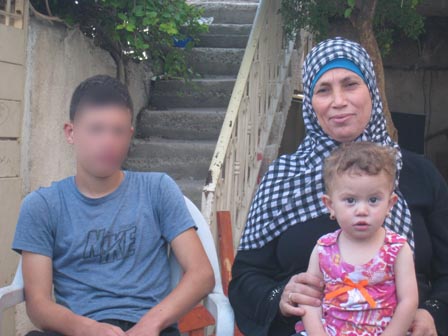Evidence of possible hostage taking
 [16 September 2014] – MCW has obtained evidence of a possible hostage taking incident which took place in the West Bank village of Deir Nidham in May 2014. The following account is taken from four testimonies collected from individuals involved in the incident.
[16 September 2014] – MCW has obtained evidence of a possible hostage taking incident which took place in the West Bank village of Deir Nidham in May 2014. The following account is taken from four testimonies collected from individuals involved in the incident.
At around 5:30 p.m., on 19 May 2014, a 17-year-old youth was detained by Israeli soldiers at a temporary checkpoint set up at the entrance to the village of Deir Nidham, situated 15 kilometres north of Ramallah. Although not arrested, he was handcuffed and detained by the soldiers manning the checkpoint. He was not told why he was being detained, but was told to telephone his family and ask someone to bring his ID card to the soldiers, which he did. A short time later his 20-year-old brother arrived at the checkpoint with his ID card and he was also detained by the soldiers, initially without explanation. While this was going on, two 13-year-old boys were also detained near the entrance to the village and questioned about the identity of stone throwers in the area. It was clear to the boys that the soldiers were looking for two other boys and were holding the first group until the wanted individuals were brought to them.
At around 9:00 p.m., one of the wanted boys, the 13-year-old brother of the two older youths, was brought to the soldiers by his family after they had heard what was going on. The younger boy was handed a mobile phone by a soldier and ordered to speak with an Israeli police interrogator who demanded that he appear the next day at a police station located inside the settlement of Binyamin. All of the young men and children were then released at around 10:00 p.m., although the soldiers kept the ID cards of the two older youths pending the attendance of their younger brother at the police station the following day. The boy’s family was told that if he did not attend the police station the next day the soldiers would return at night to arrest him.
After consulting with the boy’s father, who was traveling outside the country at the time, the family decided they would not send the boy for interrogation inside a settlement the next day because he was in the middle of school exams and the family was not provided with any documentation by the army. Several nights later, on 22 May 2014, the military raided the family home at 2:30 a.m. and arrested the 13-year-old boy. The family describes this night arrest as a terrifying experience. The family were not told why the boy was being arrested and again they were not provided with any documentation. He was painfully tied with plastic ties and placed on the metal floor of a military vehicle with another boy. He reports that he was slapped and kicked whilst on the floor of the military vehicle by the soldiers present in the vehicle. The following day, the boy was interrogated in the settlement of Binyamin and was accused of throwing stones and Molotov cocktails – an accusation which he denied. The boy appeared once before a military court and was then released without charge at 10:00 p.m. on 25 May 2014. As a result of his detention, the boy missed two of his final exams.
Under article 34 of the Fourth Geneva Convention (the Convention) the taking of hostages is prohibited. The taking of hostages is deemed sufficiently serious to be classified as a grave breach of the Convention and amounts to a war crime under article 8 of the Rome Statute of the International Criminal Court. According to the ICRC commentary accompanying the Convention, the word "hostage" must be understood in the widest possible sense. One example of hostage taking given by the ICRC consists of arresting after an attack a certain number of inhabitants of the occupied territory and announcing that they will be kept captive if the guilty are not given up.
Whilst the present case falls into the least serious category of hostage taking, the evidence does indicate that four youths were detained, not because they were personally suspected of committing an offence, but for the sole purpose of ensuring that their community gave up two other children suspected of involvement in throwing stones and Molotov cocktails. If proven, these circumstances are capable of amounting to the crime of hostage taking.





